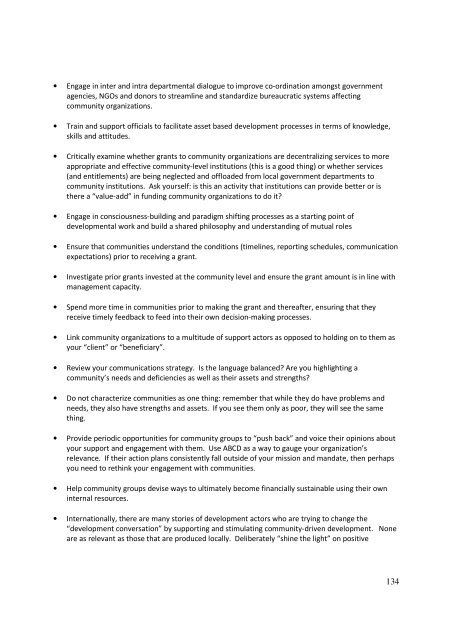ABCD-Training-of-Trainers-Tools-July-2013
ABCD-Training-of-Trainers-Tools-July-2013
ABCD-Training-of-Trainers-Tools-July-2013
Create successful ePaper yourself
Turn your PDF publications into a flip-book with our unique Google optimized e-Paper software.
• Engage in inter and intra departmental dialogue to improve co-ordination amongst government<br />
agencies, NGOs and donors to streamline and standardize bureaucratic systems affecting<br />
community organizations.<br />
• Train and support <strong>of</strong>ficials to facilitate asset based development processes in terms <strong>of</strong> knowledge,<br />
skills and attitudes.<br />
• Critically examine whether grants to community organizations are decentralizing services to more<br />
appropriate and effective community-level institutions (this is a good thing) or whether services<br />
(and entitlements) are being neglected and <strong>of</strong>floaded from local government departments to<br />
community institutions. Ask yourself: is this an activity that institutions can provide better or is<br />
there a “value-add” in funding community organizations to do it?<br />
• Engage in consciousness-building and paradigm shifting processes as a starting point <strong>of</strong><br />
developmental work and build a shared philosophy and understanding <strong>of</strong> mutual roles<br />
• Ensure that communities understand the conditions (timelines, reporting schedules, communication<br />
expectations) prior to receiving a grant.<br />
• Investigate prior grants invested at the community level and ensure the grant amount is in line with<br />
management capacity.<br />
• Spend more time in communities prior to making the grant and thereafter, ensuring that they<br />
receive timely feedback to feed into their own decision-making processes.<br />
• Link community organizations to a multitude <strong>of</strong> support actors as opposed to holding on to them as<br />
your “client” or “beneficiary”.<br />
• Review your communications strategy. Is the language balanced? Are you highlighting a<br />
community’s needs and deficiencies as well as their assets and strengths?<br />
• Do not characterize communities as one thing: remember that while they do have problems and<br />
needs, they also have strengths and assets. If you see them only as poor, they will see the same<br />
thing.<br />
• Provide periodic opportunities for community groups to “push back” and voice their opinions about<br />
your support and engagement with them. Use <strong>ABCD</strong> as a way to gauge your organization’s<br />
relevance. If their action plans consistently fall outside <strong>of</strong> your mission and mandate, then perhaps<br />
you need to rethink your engagement with communities.<br />
• Help community groups devise ways to ultimately become financially sustainable using their own<br />
internal resources.<br />
• Internationally, there are many stories <strong>of</strong> development actors who are trying to change the<br />
“development conversation” by supporting and stimulating community-driven development. None<br />
are as relevant as those that are produced locally. Deliberately “shine the light” on positive<br />
134


